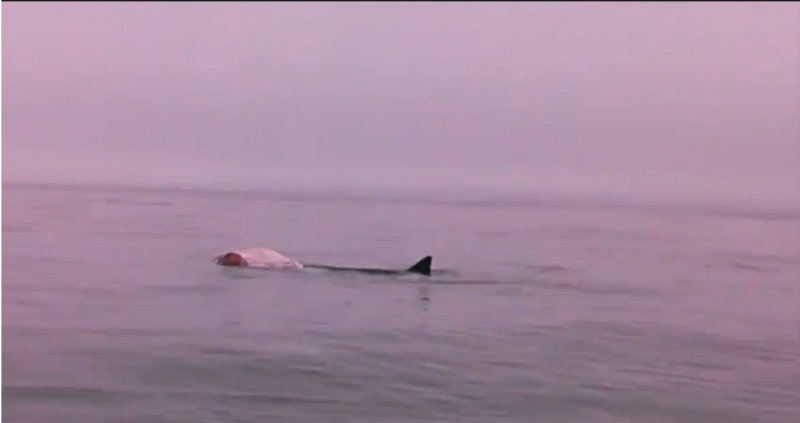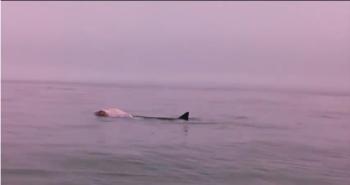Great white shark sighting
Some Boothbay Harbor lobstermen were treated to an unusual sight on July 30 — a great white shark feeding on a minke whale carcass.
Ryan Casey said he was out lobstering when he heard talk over the marine radio talking about the shark feeding on the carcass near “The Motions” bell off Damariscove Island.
Casey said he watched the shark feeding on the carcass for about 20 minutes.
“I’m not 100 percent sure it was a great white shark,” Casey said, “but it was about 15 feet long and you could see its head coming out of the water as it was feeding.” Dr. Gregory Skomal, renowned shark expert and Discovery Channel's “Shark Guy,” confirmed via email August 3 that the shark captured on Casey's video is definitely a great white shark.
Fisherman Tyler Farnham, who said he has spent most of his life on these waters, said he watched the shark feed for about two hours.
"It’s the first time I have ever seen anything like that,” Farnham said. “I probably should have been working but it was really something to see.”
Video footage captured by Casey on his cell phone shows a large shark, dark on the top and white below, methodically feeding.
Capt. Mark Stover of Redhook Charters said the great white shark is the only large shark in Maine waters that is dark grey or brown above and white below. Makos are also dual colored Stover said but they are blue on top. Stover said he has seen about a half dozen great whites in his 20 years of fishing but most in offshore waters.
“The water’s getting warmer,” Stover said. “We’re going to start seeing more unusual species here.”
Although the sighting was unusual for Boothbay Harbor, the feeding behavior is apparently not unusual for great white sharks. Scientists working off South Africa have found that dead whale carcasses can be an important food source for great white sharks. A whale carcass with its abundant blubber presents plenty of energy rich food with no work. Who could argue with that?
Seal populations, prey for great whites, have rebounded throughout the Northeast including the Gulf of Maine since the passage of the Marine Mammal Protection Act. In coastal Massachusetts, rising seal populations near Chatham appear linked to increased nearshore sightings of great white sharks, which are known to congregate and feed on seals and sea lions.
While Farnham and Casey were gazing on one of nature’s wonders, researchers in Massachusetts were setting out on a one month voyage to tag and track 20 great white sharks. If successful, the venture will be the largest shark-tagging project in the U.S. and may provide further details on a famous species that remains poorly known.
Sue Mello can be reached at 207-844-4629 or suemello@boothbayregister.com
Event Date
Address
ME
United States
























